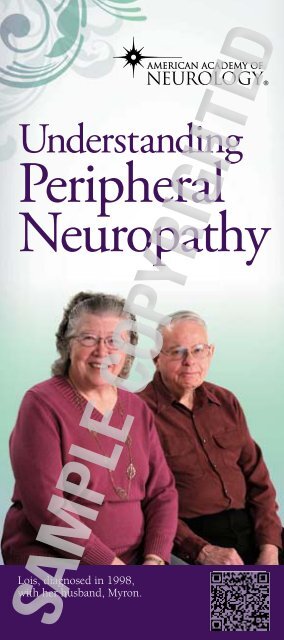Download the Peripheral Neuropathy brochure - American Academy ...
Download the Peripheral Neuropathy brochure - American Academy ...
Download the Peripheral Neuropathy brochure - American Academy ...
- No tags were found...
Create successful ePaper yourself
Turn your PDF publications into a flip-book with our unique Google optimized e-Paper software.
What Is <strong>Peripheral</strong> <strong>Neuropathy</strong>?<strong>Peripheral</strong> neuropathy is a nerve disorder. It maycause numbness, tingling, and weakness. It canalso cause pain. These symptoms usually start in<strong>the</strong> longest nerves in <strong>the</strong> body and so first affect <strong>the</strong>feet and later <strong>the</strong> hands. This is sometimes called<strong>the</strong> “stocking-glove” pattern. The symptoms usuallyspread slowly and evenly up <strong>the</strong> legs and arms. O<strong>the</strong>rbody parts might also be affected. Most people whodevelop peripheral neuropathy are over age 55. Butpeople can be affected at any age.“Stocking-Glove” Pattern of<strong>Peripheral</strong> <strong>Neuropathy</strong> SymptomsWhat Causes <strong>Peripheral</strong> <strong>Neuropathy</strong>?<strong>Peripheral</strong> neuropathy has many forms and causes.Some of <strong>the</strong> causes are still unknown. The mostcommon cause is diabetes. O<strong>the</strong>r common causesinclude alcohol abuse, poor nutrition, autoimmuneprocesses (where <strong>the</strong> body’s own immune systemattacks parts of <strong>the</strong> nerves), and genes. Exposure tocertain drugs or toxins can lead to neuropathy. Directpressure or compression of a single nerve—like incarpal tunnel syndrome—may cause it to malfunction.SAMPLE COPYRIGHTED
What Are <strong>the</strong> Symptoms?The early symptoms of peripheral neuropathy include:• Tingling• Burning• Pricking, stabbing, or shock-like pain• Muscle cramping• Numbness• Sensitivity to touchOver <strong>the</strong> years, nerve damage may worsen. Latersymptoms can include:• Weakness• Loss of muscle mass• Digestive problems• Erectile dysfunction in men• Dizziness• Balance and walking problems• Increased risk of ulcers or infections in <strong>the</strong> feetMost types of neuropathy develop and progress slowly.But some types come on quickly. For instance, withGuillain-Barré syndrome, a disorder in which <strong>the</strong>body’s immune system attacks <strong>the</strong> nerves, neuropathysymptoms appear suddenly and progress rapidly.Then <strong>the</strong>y slowly get better as damaged nerves heal.Did you know?Neurologists are medical doctors who specializein disorders of <strong>the</strong> brain and nerves. They are <strong>the</strong>specialists who often diagnose and treat peoplewith peripheral neuropathy.SAMPLE COPYRIGHTED
Living with <strong>Peripheral</strong> <strong>Neuropathy</strong>Lifestyle changes may also help relieve symptoms.Try to:• Stop smoking. Nicotine has been found to increasepain perception.• Limit alcohol consumption. While alcohol maytemporarily relieve pain, abuse can worsen symptoms.• Eat a healthy diet.• Avoid excess vitamin B 6, which can cause neuropathy atlevels of more than 100 mg daily.Living with neuropathy can affect many parts of your life.Many people find relief and support from individual orgroup counseling specifically focused on pain and relatedissues. Chronic pain support groups may also help. SeeResources for organizations to contact.Partnering with Your NeurologistTo provide <strong>the</strong> best care, your neurologist needs to knowall about your symptoms and medical history. Likewise,you need to get answers to your questions. Keeping anotebook about your condition and bringing a few wellorganizedquestions to your appointments can be helpful.SAMPLE COPYRIGHTED
For Family and FriendsLiving with neuropathy can result in emotionssuch as fear, anger, and hopelessness—for <strong>the</strong>people with <strong>the</strong> condition and for loved ones.Many people find that support groups are asource of help, comfort, and information. SeeResources for organizations to contact.Help Us Cure Brain DiseaseMake a Donation to ResearchThe <strong>American</strong> Brain Foundation supports vitalresearch and education to discover causes, improvedtreatments, and cures for brain and o<strong>the</strong>r nervoussystem diseases. To learn more or to make a donationto support research, visit www.CureBrainDisease.org.Make Your Voice HeardTo keep research advancing toward future cures andtreatments for brain disease, it is important for peopleaffected by neurologic disorders to advocate for moreresearch funding. Contact your members of Congressand ask <strong>the</strong>m to support neurology research byincreasing funding for <strong>the</strong> National Institutes of Health(NIH). Look up your Congressional representatives atwww.senate.gov and www.house.gov. Your voice canmake a difference.Take Part in ResearchPeople are needed for clinical trials that can helpfind new treatments for neurologic disorders. Clinicaltrials are research studies. They help ensure thatnew drugs are both safe and effective. Ask yourneurologist how to volunteer for a clinical trial. Youcan also find trials through patient organizations or<strong>the</strong> <strong>American</strong> <strong>Academy</strong> of Neurology website atwww.aan.com/view/clinicaltrials.SAMPLE COPYRIGHTED
www.aan.com(800) 879-1960The <strong>American</strong> <strong>Academy</strong> of Neurology, an association of25,000 neurologists and neuroscience professionals, isdedicated to promoting <strong>the</strong> highest quality patient-centeredneurologic care. For more information about <strong>the</strong> <strong>American</strong><strong>Academy</strong> of Neurology, visit www.aan.com.Cover photo by Jim HopwoodSAMPLE COPYRIGHTED©2012 <strong>American</strong> <strong>Academy</strong> of Neurology Institute









